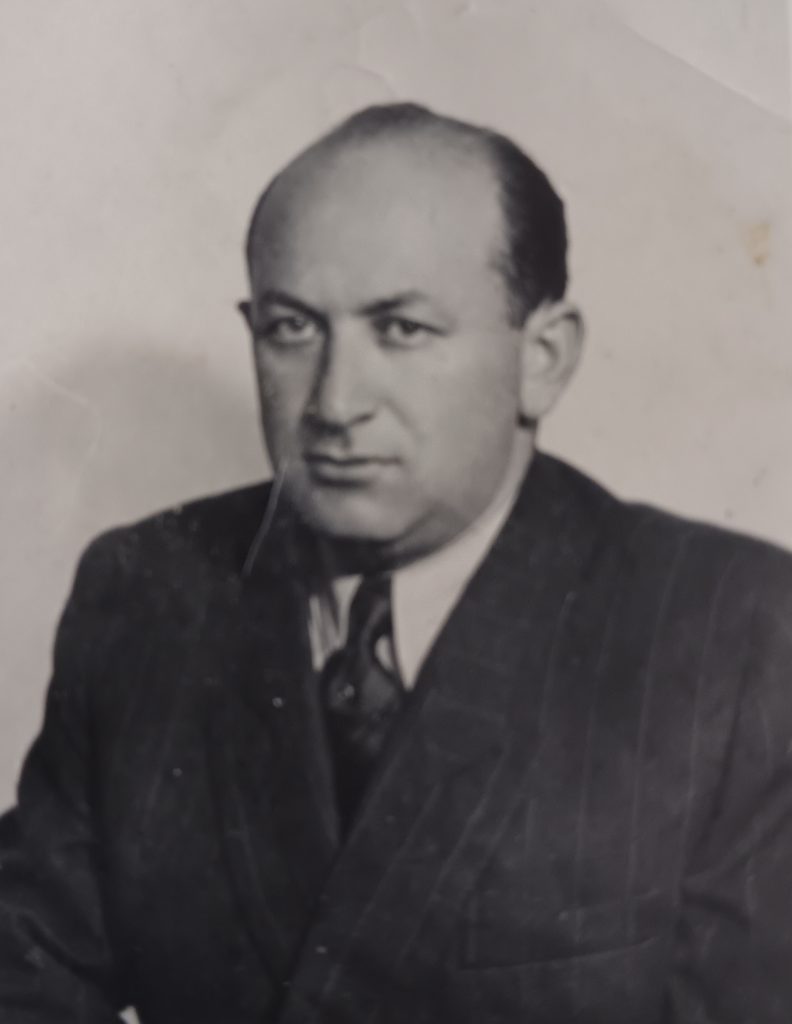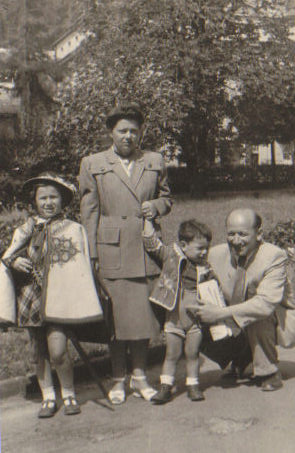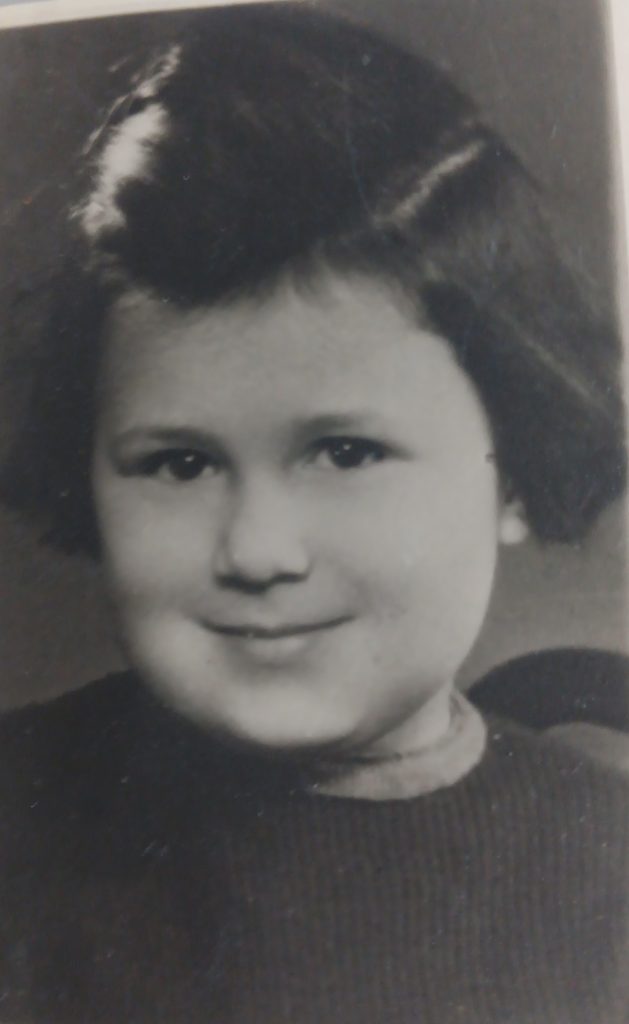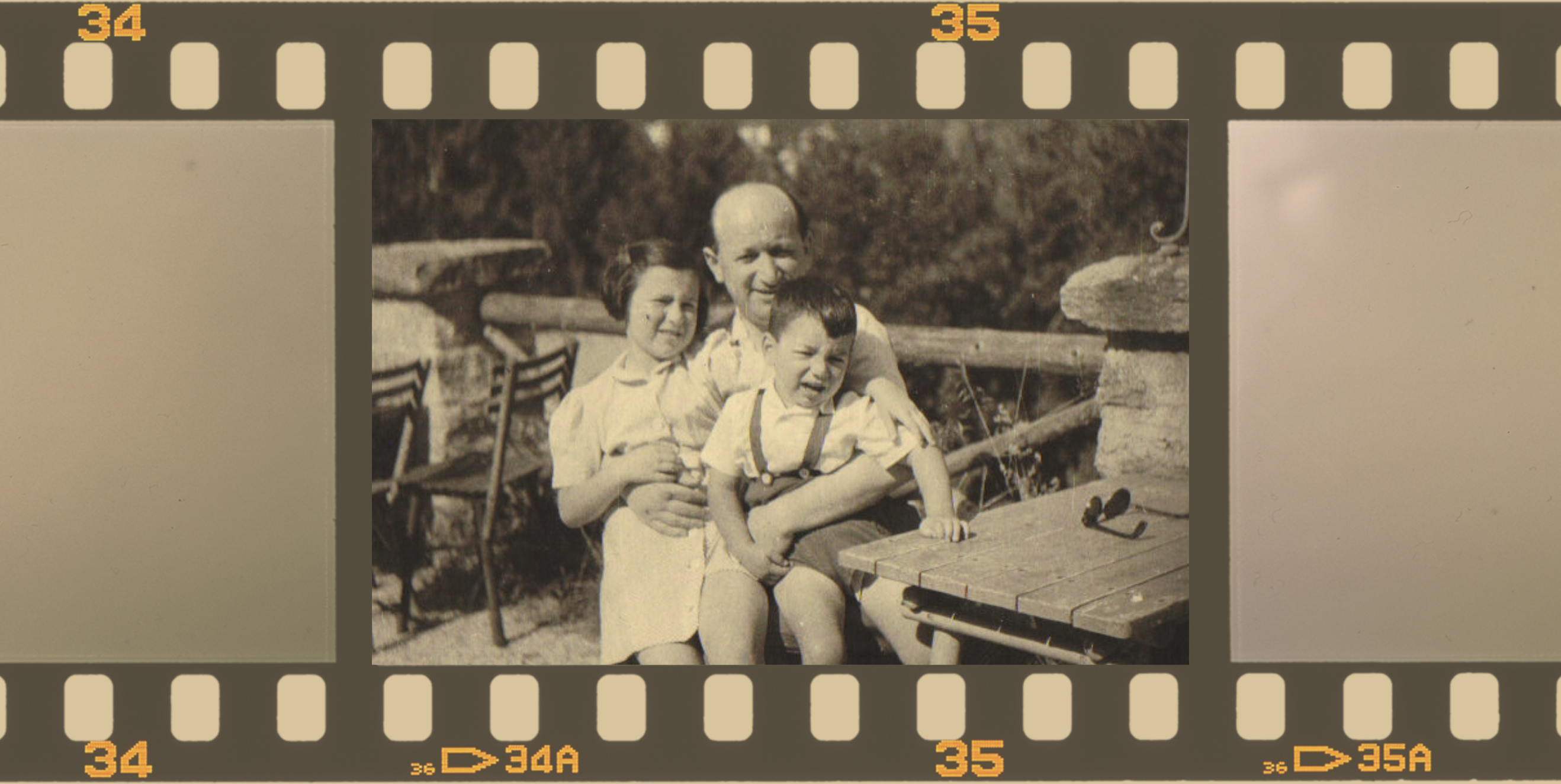An Evening That Changed My Life
Adapted from my book Amazing Journey, Metamorphosis of a Hidden Child, 2010.
Brussels, Belgium 1947. It is evening. Four of us are sitting in a large kitchen in our small apartment. Our family had left Poland. No more nurses, maids, or au pairs. We are in Brussels where Uncle has a distant cousin. No longer do we have our beautiful large apartment but are living in a dark, two-room flat. It is located halfway underground – our windows are on street level.
I am seven years old and anxious. Starting tomorrow, I will be in a new school. It is not only a new school building but a school in a foreign country where teachers teach in a foreign language. I will be in second grade, learning to speak, read and write French.
Our kitchen also serves as a dining room, den and living room. One bare bulb hanging from the ceiling is the only light. The four of us are sitting around a bare, square wooden table. Uncle and Mother sit facing me. My brother, Leon, is sitting on my mother’s lap. He is one year old and is wearing a blue knit bunting with a white top. Am I imagining this? Can’t be. This scene is engraved in my mind.
I remember hearing my mother telling Uncle several times earlier during the day, “You must tell her. I do not want her to go to school without knowing.” At the time, I do not recollect paying any attention to that conversation. Interestingly, I do not recall being curious as to what I was supposed to know. That evening, I am told to sit down at the table because Uncle needed to tell me something. I am not sure, nor do I remember how he started or his exact words. What I do remember is hearing that my life will change forever.
Never again will I:
- go to church.
- smell the incense.
- push myself to the altar to be as close as I could to the priest.
I am actually Jewish, not Catholic.
“We are Jews,” says Uncle. “We had to pretend to be Catholic to protect our lives. I am Jewish, your mother is Jewish, your grandmothers and grandfathers were Jews. Our whole family has been Jewish forever. And one more thing,” he adds, “I am not your stepfather or your uncle – I did not marry your mother after the war. You never had a father, a Polish soldier killed while fighting the Germans. I am your real father. You are my daughter just as your brother is my son.”
I do not remember how I felt; in fact, feelings seem to have played a very small part of my life. What I do remember from that night is that I go to the room where I sleep, as in a dream, take out the beautiful white and gold Catholic hymnal my au pair gave me as a goodbye present, and tear it to pieces. Why do I do that? To this day I have no explanation. There seem to have been no feelings attached to this action, no guilt.
Now, however, as an adult, I wish I still had it as a memento. I still do have a little gold pendant depicting Mary with her infant that I wore in Sopot, Poland. And I resisted many attempts to make me give it up. For reasons that I do not understand, I find it very precious. I have had a harder time accepting the fact that “Uncle” is my biological father. For many years, I doubted that this was indeed true. After all, I kept thinking that I was adopted. One day, however, as a teenager, I was looking in the mirror, combing my hair when it struck me — I looked just like him. I thought, “Actually, I really am his biological daughter. Just look at my face!” Sadly, I never really bonded with my father. We were never able to establish a father-daughter relationship.

Friends have asked me if I miss going to church. Many hidden children sneak into church. I don’t remember ever wanting to go into a church to pray. When I do go into a church now, it is as a visitor, sightseeing. But I have to admit I have a “funny” feeling when entering one; a feeling I cannot describe that stirs some deep-seated emotions. Very occasionally, I do have scary experiences remnants of my childhood.
One time, shortly after my father’s death, I am sitting in the synagogue on a Saturday morning. Suddenly, I smell this unreal whiff of incense which is erringly real. For a very, very brief moment I am transported back into my childhood and have the impression of being in church. This feeling lasts only a few moments, yet it is so strong that I almost panic. What am I to do? Why do I feel that way? Am I being dragged back into my childhood? Is the past catching up with me? That feeling and the smell never came back but it scared me because it puts my whole current life into question.
It is 2004, Mel Gibson’s movie “The Passion of Christ” has generated great controversy, especially among the Jewish press. I am sitting home in my den, reading a review of the film. Suddenly, I see this large image in front of me. It is a larger-than-life figure of Jesus. He stands erect with his arms stretched halfway in front of him, palms turned upwards. His light brown, wavy hair is shoulder length. He is wearing a white gown and has a medium blue full-length cloak draped around his shoulders. This vision lasts only about a couple of seconds, but it is frighteningly real.
But back in Brussels, in 1947, my parents have other worries than the feelings of a seven-year-old. They have to rebuild their lives for the second time in two years. My mother, still recuperating from her surgery, needs to take care of a sick baby. She is thrown into a new world again, one whose language she neither speaks nor understands. She is left alone for weeks to fend for herself.
Father must find a way to make a living. Belgian authorities are quite willing to give political asylum to refugees from the Communist world but will not give them a work permit. Belgium is rebuilding after the war. It is not about to permit foreigners to take jobs away from their soldiers who are coming home from the war. So, Father ends up “commuting” to Germany. He spends weeks there building a business, pulling himself up, making life financially more comfortable for us.

Most of my memories from those years in Belgium are fond. We moved several times, I remember, each time to a better and bigger apartment. I remember going to school, being put in charge of my brother and taking him to the park after school. Even though I do not always enjoy being his “nanny,” I never rebel, never complain. My mother often told me later that I “never gave her any trouble.” I was always a “good little girl,” doing what I was supposed to.
If I resent having to walk and rock my brother to sleep for hours, I do not complain. I am well trained to do what I was supposed to. Mother never knows how terrified I am when she goes out at night occasionally and leaves me alone in charge of my brother. Lying in bed in the dark, I keep seeing all kinds of shapes that resemble people or animals. Terrified, I do not even consider putting on the light nor mentioning my fears to Mother.
Only two friends my age come to mind from those years, two sons of friends of my parents, also survivors. They are in transit to other destinations — Argentina and Brazil — and too soon, they leave. Besides them, there is a neighbor’s son with whom I play marbles. There does not seem to be any contact with the girls from school. One time, however, as I am walking home with several classmates, one girl mentions her grandparents. I am startled, “Grandparents? I do not know anyone who has grandparents. Grandparents are mythical beings, not real living people.”
My favorite pastime in those years is going to the movies. Being an avid movie fan, I especially like American movies. I am allowed to go to the movies every Sunday afternoon and always go alone. That seems quite normal to me. It is the highlight of my week.

I will never forget Lana Turner in “The Three Musketeers.” Being so enthralled with that movie, I sit through two showings. When I come home two hours late, Mother is frantic, pacing in front of the house, waiting for me. She feels helpless, does not know what to do. She has visions of me disappearing and of her not being able to find me ever again. I receive a big lecture about responsibility and the fact that I must never do anything to give mother problems. After all, I “was torn away from Hitler’s henchmen” and I am “precious.”
Please leave your comments below.
Read more by Felicia Graber.


Felicia, I love your stories of your young life. They are so interesting about real events of which I have read many, but yours are personal which makes them special. So glad you have a good memory and are willing to share with us.